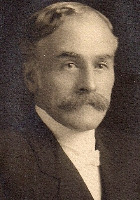Henry Ainsworth
Henry Ainsworth Poems
Jehovah feedeth me, I shall not lack ;
In grassy folds he down doth make me lye,
He gently leads me quiet waters by,
He doth return my soul : for his name sake
...
CONFESSE ye to Jehovah thankfully.
For he is good : for ever his mercy,
Let the redeemed of .lehovah say.
Whom he from foes' hand hath redeem'd away.
...
By Babel's rivers there sate wee,
Yea wept, when wee did mind Sion;
The willowes that amidds it bee
Our harps we hanged them upon :
...
Henry Ainsworth Biography
Henry Ainsworth (1571–1622) was an English Nonconformist clergyman and scholar. He was born of a farming family of Swanton Morley, Norfolk. He was educated at St John's College, Cambridge, later moving to Caius College, and, after associating with the Puritan party in the Church, eventually joined the Separatists. Driven abroad about 1593, he found a home in "a blind lane at Amsterdam", acting as "porter" to a bookseller, who, on discovering his knowledge of Hebrew, introduced him to other scholars. When part of the London church, of which Francis Johnson (then in prison) was pastor, reassembled in Amsterdam, Ainsworth was chosen as their doctor or teacher. In 1596 he drew up a confession of their faith, reissued in Latin in 1598 and dedicated to the various universities of Europe (including St Andrews, Scotland). Johnson joined his flock in 1597, and in 1604 he and Ainsworth composed An Apology or Defence of such true Christians as are commonly but unjustly called Brownists. Organizing the church was not easy and dissension was rife. Though often involved in controversy, Ainsworth was not arrogant, but was a steadfast and cultured champion of the principles represented by the early Congregationalists. Amid all the controversy, he steadily pursued his studies. The combination was so unique that some have mistaken him for two different individuals. (Confusion has also been occasioned through his friendly controversy with one John Ainsworth, who left the Anglican for the Roman Catholic church.) In 1610 Ainsworth was forced reluctantly to withdraw, with a large part of their church, from Johnson and those who adhered to him. A difference of principle as to the church's right to revise its officers' decisions had been growing between them; Ainsworth taking the more Congregational view. In spirit he remained a man of peace. He died in 1622 in Amsterdam.)
The Best Poem Of Henry Ainsworth
Psalm Xxiii
Jehovah feedeth me, I shall not lack;
In grassy folds he down doth make me lye,
He gently leads me quiet waters by,
He doth return my soul: for his name sake
In paths of justice leads me quietly.
Yea, though I walk in dale of deadly shade.
He fear none ill, for with me thou wilt be;
Thy rod, thy staff, eke they shall comfort me:
Fore me a table thou hast ready made,
In their presence that my distressers be:
Thou makest fat mine head with ointing oil;
My cup abounds. Doubtless good and mercy
Shall all the days of my life follow me:
Also within Jehovah's house I shall
To length of dayes repose me quietly.

The photo doesn't match. It can't be Henry Ainsworth, not by 1610, the date of his death.200+ years too soon for a photograph.